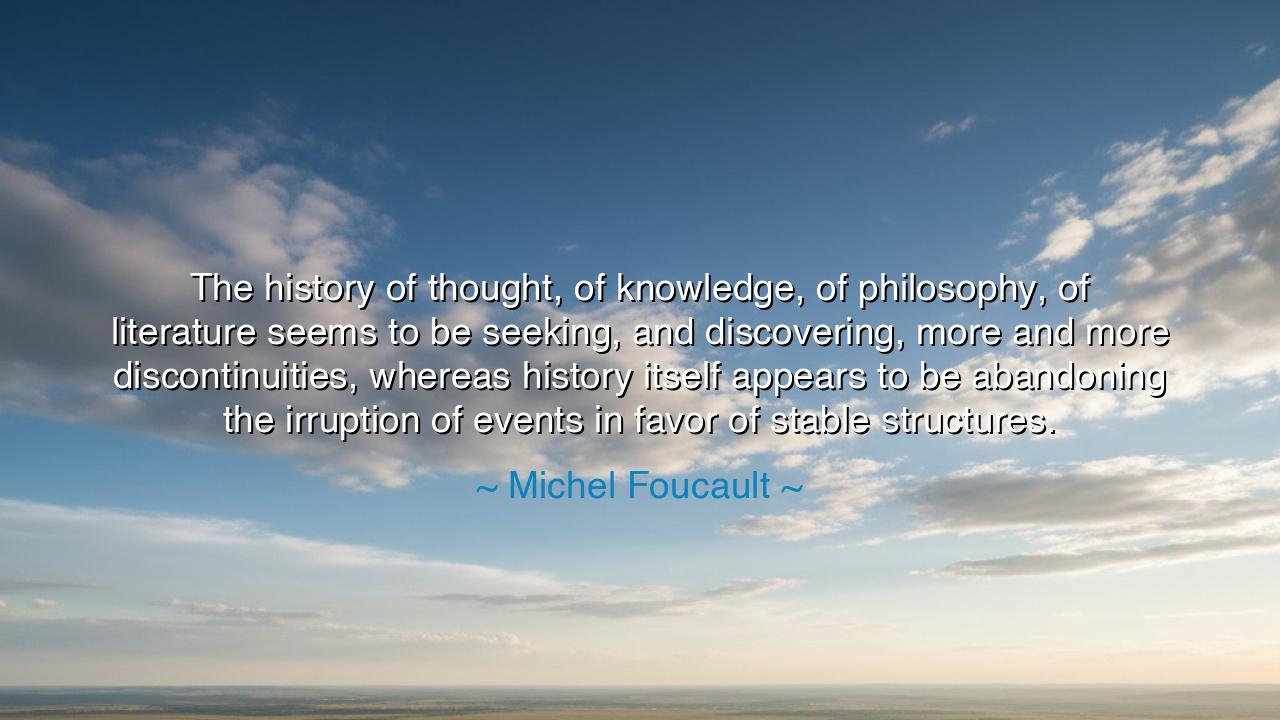
The history of thought, of knowledge, of philosophy, of
The history of thought, of knowledge, of philosophy, of literature seems to be seeking, and discovering, more and more discontinuities, whereas history itself appears to be abandoning the irruption of events in favor of stable structures.






The words of Michel Foucault—“The history of thought, of knowledge, of philosophy, of literature seems to be seeking, and discovering, more and more discontinuities, whereas history itself appears to be abandoning the irruption of events in favor of stable structures.”—are not the idle musings of a scholar, but the cry of one who gazed into the fabric of time and saw its paradox. He speaks of two currents: the current of ideas, forever restless, breaking apart the smooth flow of tradition into fragments and ruptures; and the current of history as written by institutions, which strives to smooth the chaos of events into structures, systems, and patterns. It is the tension between the unpredictable force of thought and the stabilizing hand of power.
To speak of discontinuities is to admit that knowledge does not flow as a gentle river, but erupts like a mountain breaking from the earth. Philosophy does not move smoothly from one age to the next, but often explodes in revolutions—Socrates questioning the gods of Athens, Descartes shattering medieval scholasticism with his “I think, therefore I am,” Darwin overturning centuries of belief with evolution. These are not gentle transitions, but ruptures, irruptions in the history of thought. Foucault, the archaeologist of ideas, called us to see these breaks clearly, rather than pretending that thought grows only in harmony.
And yet, he contrasts this with the way history itself is often told: as if it were a march of structures, a story of systems—governments, economies, institutions—rising and falling in patterns. Historians, he suggests, seek stability, the steady thread that explains centuries. They downplay the wildness of events, the sudden chaos of revolutions, the unpredictable nature of human life. They search for what endures, not for what ruptures. Thus, while philosophy and knowledge embrace discontinuity, history as discipline embraces continuity.
Consider the French Revolution. In the minds of philosophers and writers, it was a break so sharp that it tore apart the very fabric of meaning: liberty, equality, fraternity arose from blood and fire. Yet in the telling of history, one often hears of structures—economic pressures, class systems, monarchy, and Enlightenment ideas—as if the Revolution were the inevitable unfolding of systems rather than the violent eruption of events. Foucault warns us here: do not let structure bury event, do not let order erase rupture. For it is in the tension of both that truth resides.
We can also recall the Scientific Revolution. Copernicus, Galileo, and Newton did not gently add their thoughts to what came before—they broke it. They declared the earth not the center, shattered the heavens into laws of gravity, stripped away myths and replaced them with mathematics. Yet when history is told, we hear of “the age of science,” a structure, a pattern, rather than the trembling discontinuities of individuals who dared to stand against dogma. Here again, knowledge seeks rupture, history seeks structure.
The lesson is profound: to live wisely, one must honor both forces. We must recognize that in our own lives, discontinuities will come—moments when old ideas no longer serve, when new visions demand birth, when sudden change tears the fabric of routine. Yet at the same time, we must also build structures, stable patterns that give continuity and meaning, lest we drown in chaos. To deny discontinuity is blindness; to deny structure is instability. Wisdom lies in holding both.
So, O seeker, take Foucault’s teaching as a guide. Do not believe that history is only smooth progression; look for the ruptures, the moments when everything changed. Do not believe that thought is always gentle growth; see the revolutions of the mind, the lightning strikes that shift human destiny. Learn from both: let your mind embrace change, but let your life build structure. For only when we honor both the wildness of thought and the steadiness of history can we truly understand the dance of human destiny. Discontinuity and structure, rupture and stability—both are needed, both are true. And in the rhythm between them, life unfolds.






AAdministratorAdministrator
Welcome, honored guests. Please leave a comment, we will respond soon